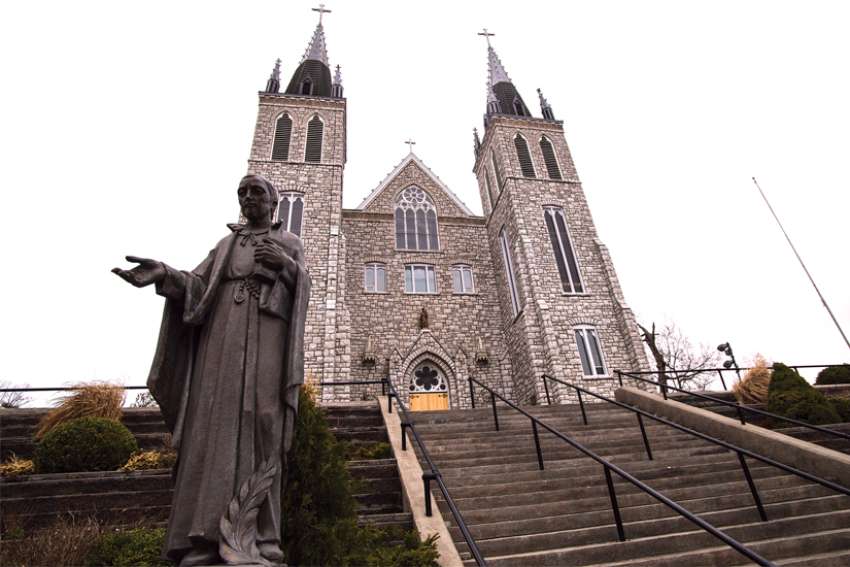Martyrs’ Shrine in Midland, Ont., announced April 16 that its scheduled opening May 2 won’t proceed and it won’t be able to sustain seasonal staffing, which means the major cultural pilgrimages that are a staple of the season have all been postponed until 2021.
Current plans call for the season to open July 4, pending advice from public health departments.
“It’s a harsh reality of the circumstances,” said Allex Laurin, manager of marketing and programs at Martyrs’ Shrine.
Martyrs’ Shrine is the national shrine to the Canadian Martyrs, honouring the Jesuit missionaries and their companions who lived, worked and died in the heart of the Huron Confederacy in the mid-1600s.
The Jesuit-run shrine was set to open for its 94th season. Each year more than 100,000 people visit the Shrine and its 75-acre grounds for pilgrimages or prayer with the relics.
It is financially reliant on these visitors’ gate fees and donations to fund the $1.1- to $1.2-million annual budget, so is sure to take a financial hit this season. Laurin said he’s confident benefactors and friends will help the Shrine weather the storm.
“We will be in a situation of need, I think that’s safe to say,” said Laurin. “But in our sector we always have faith in that what we’re doing, something that is meaningful to people…. We’re confident in some way, shape or form we will find the means to sustain ourselves and carry ourselves into next season.”
To help pilgrims meet their spiritual needs, the Shrine is developing web-based spiritual content. Ideas bandied about are live-streamed Masses, partnering with cultural pilgrimage organizers to produce prayer services and virtual tours of the picturesque grounds. And in a time when there’s a greater demand for prayer, said Laurin, intentions are being accepted online where a Jesuit priest will light a votive candle and pray for an intention.
Though the grounds are closed, Laurin said people continue to show up hoping to pray in the church. It’s tricky with the restrictions in place, but the Shrine tries to accommodate people as best it can.
“The fact of the matter is we’re a religious site and people have devotions,” he said.
Martyrs’ Shrine is a seasonal destination, unlike many others across Canada that are open to visitors and pilgrims year-round. St. Anne de Beaupre east of Quebec City is probably the busiest shrine in Canada, drawing an estimated 800,000 visitors annually. But like all places of worship, restrictions have seen its doors closed for the time being.
It’s the same at the Shrine of Our Lady of the Cape (Cap du la Madeline), halfway between Quebec City and Montreal on the shores of the St. Lawrence River in Trois Rivieres, Que. Events have been cancelled for the foreseeable future. Yet over Easter, rector Msgr. Pierre-Olivier Tremblay put plans in place for the inevitable pilgrims for its annual Easter water harvesting. Security guards were posted at the entrance as well as near the Easter water source to check for people with symptoms and to make sure crowds did not gather.
Most shrines are staying in touch with followers through YouTube channels and Facebook pages.
In Alberta, the annual Lac Ste. Anne pilgrimage in the Edmonton archdiocese that attracts thousands and dates back more than a century has also fallen victim to the pandemic. It’s the first time such measures have been taken in living memory, said Edmonton Archbishop Richard Smith.
“This is a very sad and difficult decision obviously, but we also realize it’s a necessary one,” said Smith in a video message announcing the decision of the board of trustees. “We simply cannot hold this event when we know that doing so would risk the health and possibly the life of the people who participate.”
An estimated 35,000 people from across Canada attend the annual July pilgrimage to Lac Ste. Anne, renowned for its healing waters and spiritual significance to Catholics and Indigenous people.
(With files from Grandin Media)


